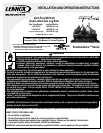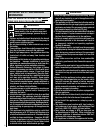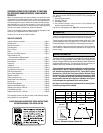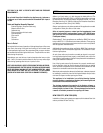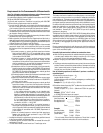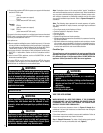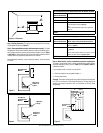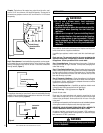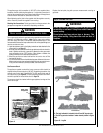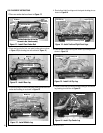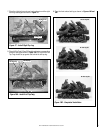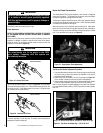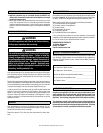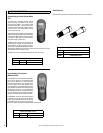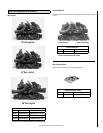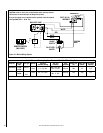Special offers from our partners!

Find Replacement BBQ Parts for 20,308 Models. Repair your BBQ today.

5
This heater shall not be installed in a confined space or unusually tight
construction unless provisions are provided for adequate combustion
and ventilation air. The heater may be located in unusually tight construc
-
tion provided the space is unconfined, or if confined, is provided with two
permanent openings communicating directly with an additional room(s)
of sufficient volume so that the combined volume of all connected spaces
meets the criteria for an unconfined space, (National Fuel Gas Code
NFPA 54 / ANSI Z223.1 (latest edition), Section on Air for Combustion
and Ventilation. Generally 50 ft
3
per 1,000 BTU input of all operating
appliances in the space.
The National Fuel Gas Code, ANSI Z223.1/NFPA 54-latest edition defines
a confined space as a space whose volume is less than 50 cubic feet per
1000 Btu per hour (4.8 m³ per kW) of the aggregate input rating of all
appliances installed in that space and an unconfined space as a space
whose volume is not less than 50 cubic feet per 1000 Btu per hour (4.8
m³ per kW) of the aggregate input rating of all appliances installed in
that space.
Rooms communicating directly with the space in which the appliances
are installed, through openings not furnished with doors, are considered
a part of the unconfined space.
Unusually tight construction is defined as construction where:
a. Wall and ceilings exposed to the outside atmosphere have a continu-
ous water vapor retarder with a rating or one perm (6 x 10-11 kg per
pa-sec-m2) or less with openings gasketed or sealed;
b. Weather stripping has been added on operable windows and doors;
and
c. Caulking or sealants are applied to areas such as joints around window
and door frames, between sole plates and floors, between wall-ceiling
joints, between wall panels, at penetrations for plumbing, electrical,
and gas lines, and at other openings.
Use the following equations to determine if you have a confined or
unconfined space.
1. Determine the volume of space — ft
3
.
Length x Width x Height = _____ ft
3
(Include adjoining rooms with doorless passageways or ventilation grills
between rooms).
Example: 24' (L) x 16' (W) x 8' (H) = 3072 ft
3
2. Divide the volume of space by 50 ft
3
to determine the maximum BTU/Hr
the space can support.
(volume of space – ft
3
) / 50 ft
3
= (Maximum BTU/Hr the space can
support)
Example: 3072 ft
3
/ 50 ft
3
= 61.44
or 61,440 BTU/Hr the space can support.
3. Add the BTU/Hr of all the fuel burning appliances in the space.
Vent-Free Heater
________ BTU/Hr
Gas Appliance #1*
________ BTU/Hr
Gas Appliance #2 +
________ BTU/Hr
Total =
________ BTU/Hr
Example:
Vent-Free Heater 36,000 BTU/Hr
Gas Appliance #1 35,000 BTU/Hr
(water heater)
Total = 71,000 BTU/Hr
* Do not include Direct-Vent Gas Appliances. Direct-Vent is sealed
combustion and draws combustion air from the outdoors.
Requirements for the Commonwealth of Massachusetts
Note: The following requirements reference various Massachusetts
and national codes not contained in this document.
Un-vented Room Heaters shall be installed in accordance with 527 CMR
30.00 and 248 CMR 3.00 through 7.00:
(a) Permits and Inspections: In addition to complying with 248 CMR
3.05 the following requirements must be satisfied:
1. A permit shall be obtained from the head of the fire department and
the local or state gas inspector having jurisdiction for the installation
of all unvented propane or natural gas-fired space/room heaters.
2. The permits shall be conditioned upon final inspection and approval
of installation by the head of the fire department and the local or state
gas inspector having jurisdiction.
3. A copy of the manufacturer’s installation/operating literature shall be
submitted with each permit application.
4. Before operation, the Head of the Fire Department and the local or
state gas inspector shall inspect the installation for compliance with
527 CMR (Board of Fire Prevention Regulations) and 248 CMR (Board
of State Examiners of Plumbers and Gas Fitters).
5. A final inspection by the state or local gas inspector of the unvented
space/room heater shall not be performed until proof is provided
that the head of the fire department having jurisdiction has granted
a permit.
(b)Unvented propane or natural gas-fired space/room heaters
shall conform to ANSI Z21.11.2, be equipped with an oxygen
depletion safety (ODS) shutoff system and be Product-approved
in accordance with 248 CMR.
(c)Unvented propane or natural gas-fired space/room heaters
shall be installed in accordance with their listings and the
manufacturer’s instructions. Proper clearances to combustibles
shall be maintained. In no case shall the clearances be such as
to interfere with combustion air and accessibility.
(d)Installations shall be of a permanent type, with a permanently
piped fuel supply in accordance with 248 CMR. LPG appliances
shall be subject to the storage requirements in accordance with
527 CMR 6.00. Portable unvented propane or natural gas-fired
space/room heaters shall be prohibited.
(e)Unvented propane or natural gas-fired space/room heaters shall
be prohibited in bedrooms and bathrooms.
(f)Space/room heaters shall be properly sized for the room or space
of installation, but shall not exceed a maximum of 40,000 BTU
input per room or space.
(g)In occupancies with an unvented propane or natural gas-fired
space/room heater, no less than one listed carbon monoxide
detector that is installed in accordance with the manufacturers
instructions shall be installed and maintained near the space
where the heater is located.
1. Any building wherein the heater is to be installed shall,
as a precondition to such installation, have working smoke
detectors installed and maintained in accordance with the
requirements of 780 CMR (State Board of Building Regulations
and Standards) in effect at the time of construction or;
2. If no requirement was in effect at the time of construc
-
tion the smoke detector shall be compliant and installed as
provided for in M.G.L. c. 148, § 26E.
(h)In rooms and buildings served by an unvented propane or
natural gas-fired space/room heater, a primary source of heat,
which is operable, shall be permanently installed and maintained
in the building in accordance with 105 CMR (Department of
Public Health).
(i)Sellers of unvented propane or natural gas-fired space/room
heaters shall provide to each purchaser a copy of 527 CMR
30.00 upon sale of the unit.
• Installation and repair must be done by a plumber or gas fitter licensed
in the Commonwealth of Massachusetts.
• The flexible gas line connector used shall not exceed 36 inches (92
centimeters) in length.
• The individual manual shut-off must be a T-handle type valve.
COMBUSTION AND VENTILATION AIR



